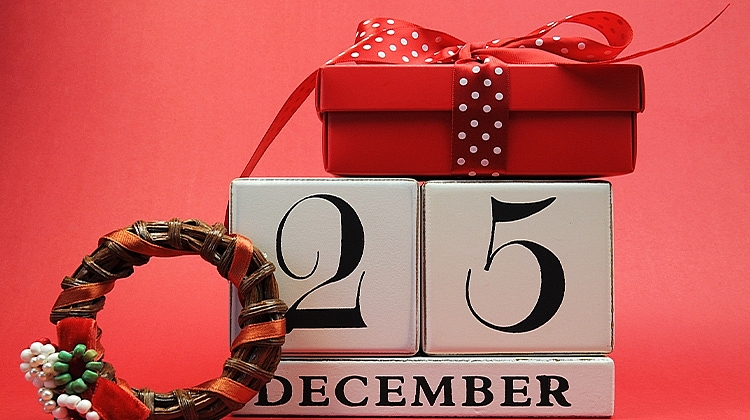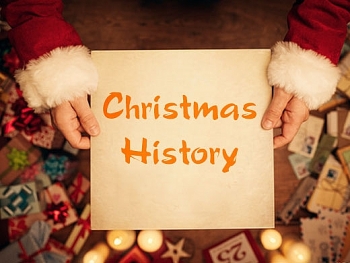Why is Christmas Day on the 25th December?
 |
| Why do we celebrate on December 25th? |
Most Christians today probably can’t imagine Christmas on any other day than December 25.
Christmas is celebrated to remember the birth of Jesus Christ, who Christians believe is the Son of God. The name 'Christmas' comes from the Mass of Christ (or Jesus). Christmas is now celebrated by people around the world, whether they are Christians or not. It's a time when family and friends come together and remember the good things they have. People, and especially children, also like Christmas as it's a time when you give and receive presents!
Why Is Christmas Celebrated on December 25?
The Date of Christmas
No one knows the real birthday of Jesus! No date is given in the Bible, so why do we celebrate it on the 25th December?
The birth was first thought — in around 200 A.D. — to have taken place on Jan. 6. Why? Nobody knows, but it may have been the result of “a calculation based on an assumed date of crucifixion of April 6 coupled with the ancient belief that prophets died on the same day as their conception,” according to religionfacts.com. By the mid-fourth century, the birthday celebration had been moved to Dec. 25. Who made the decision? Some accounts say it was the pope; others say it wasn’t.
The early Christians certainly had many arguments as to when it should be celebrated! Also, the birth of Jesus probably didn't happen in the year 1 but slightly earlier, somewhere between 2 BCE/BC and 7 BCE/BC, possibly in 4 BCE/BC (there isn't a 0 - the years go from 1 BC/BCE to 1!).
The first recorded date of Christmas being celebrated on December 25th was in 336, during the time of the Roman Emperor Constantine (he was the first Christian Roman Emperor). But it was not an official Roman state festival at this time.
People and religions of the day celebrated some sort of holiday around that time. From Jewish Chanukah to Pagan Winter Solstice to Germanic Yule to Roman Dies Natalis Solis Invicti (Birth of the Unconquered Sun); the sheer number of celebration days with trees, decorations, yule logs, mistletoe and feasts seem to point to a season of celebration to which Christians added the birth of Jesus as a counter-cultural event and possibly even an escape from the pagan holidays for early believers.
December 25th was the Saturnalia Festival of emancipation, gift giving and the triumph of light after the longest night. The Christian sees the truth implicit in this pagan tradition that reflects: Christ the Light of the world, His triumph over the night of sin in Luke 1:78-79:
"...Because of the tender mercy of our God, by which the rising sun will come to us from heaven 79 to shine on those living in darkness and in the shadow of death, to guide our feet into the path of peace.”
The second theory centers around the date “accepted” by the Western Church of March 25 as the Annunciation or Immaculate Conception of Jesus in Mary’s womb. December 25 is 9 months later and thus celebrated as the birthday of Jesus. Regardless of the possible reasons for the date, the church calendar was set in the West during Constantine’s reign while the Eastern Church held onto the date of January 6 for some time.
 |
| Why Is Christmas Celebrated on December 25? |
Christmas Was Probably Not the Day Christ was Born
First, let’s take a quick look at why Christmas probably wasn’t Jesus’ day of birth. As the Catholic Encyclopaedia states “there is no month in the year to which respectable authorities have not assigned Christ’s birth” (Catholic Encyclopaedia). That being said, there are several reasons supporting the idea that Jesus wasn’t born in December. Luke 2:8 states that on the night of Jesus’ birth “there were also in that same country shepherds living out of doors and keeping watches in the night over their flocks.” Scholars tend to agree that it is highly unlikely that shepherds were out with their flocks in the cold winter month.
Luke 2:1-4 also claims that Joseph and Mary were traveling to Bethlehem to register in a Roman census when Jesus was born. These censuses were not known to have occurred in winter – also making it improbable to link Jesus’ birthday with the day now called Christmas.
Pagan Festivals
Okay, so Jesus probably wasn’t born on December 25th. Yet other important events did fall at that time of year for ancient pagans. The most well-known of these celebrations were Saturnalia and the birthday of the Sun God, Mithra.
Originally, Saturnalia was held on December 17th, though the festival eventually was extended until December 25. This celebration honored Saturn, the God of Sowing and Husbandry, and was linked to the rise of a new year and the return of light. Ancient Romans would celebrate this date with a public banquet, giving gifts, partying, and holding a sacrifice in the Temple of Saturn.
Mithra’s Birthday?
Roman Pagans who worshipped Mithras believed he was born on December 25th – the most holy day of the year for many ancient believers. This was a well-known cult for the Roman military in the 1st to 4th centuries AD. But Mithras is a god who has his origins in Persia beginning around the 6th century BC. The proto-Indo-Iranian language calls him ‘Mitra’, but that name was later adapted into Greek as ‘Mithras’. Many scholars believe that Roman soldiers discovered this god while completing military campaigns in Persia.
The Mithraic New Year and Mithras’ birthday were celebrated on 25 December. The date was part of the Roman Natalis Invicti festival – a celebration linked to worshipping the sun in general.
Different theories as to why Christmas is celebrated on December 25th
One of the prevalent theories on why Christmas is celebrated on Dec. 25 was spelled out in “The Golden Bough,” a highly influential 19th-century comparative study of religion and mythology written by the anthropologist James George Frazer and originally published in 1890. (The first edition was titled “The Golden Bough: A Study in Comparative Religion”; the second edition was called “The Golden Bough: A Study in Magic and Religion.” By the third printing, in the early 20th century, it was published in 12 volumes, though there are abridged one-volume versions.)
A very early Christian tradition said that the day when Mary was told that she would have a very special baby, Jesus (called the Annunciation) was on March 25th - and it's still celebrated today on the 25th March. Nine months after the 25th March is the 25th December!
March 25th was also the day some early Christians thought the world had been made, and also the day that Jesus died on when he was an adult (Nisan 14 in the Jewish calendar) and they thought that Jesus was conceived and had died on the same day of the year.
The Winter Solstice is the day where there is the shortest time between the sun rising and the sun setting. It happens on December 21st or 22nd in the Northern Hemisphere. (In the Southern Hemisphere, this time is the Summer Solstice and the Winter Solstice happens in late June.)
To pagans this meant that they knew that the days would start getting lighter and longer and the nights would become shorter - marking a change in the seasons. To celebrate people had a mid-winter festival to celebrate the sun 'winning' over the darkness of winter. At this time, animals which had been kept for food were also often killed to save having to feed them all through the winter and some drinks which had been brewing since the autumn/harvest would also be ready to drink. So it was a good time to have a celebration with things to eat and drink before the rest of the winter happened. (We still have New Year celebrations near this time now!)
In Scandinavia, and some other parts of northern Europe, the time around the Winter Solstice is known as Yule (although the word Yule only seems to date to about the year 300). In Eastern Europe the mid-winter festival is called Koleda.
In Iranian/Persian culture, the winter solstice is known as 'Yalda Night' or 'Shab-e Chelleh' and it's a time when families and friends come together to eat, drink and recite poetry. Shab-e Chelleh means 'night of forty' as it happens forty nights into winter. The word Yalda means 'birth' and comes from early Christians living in Persia celebrating the birth of Jesus around this time. Eating, fruits, nuts, pomegranates and watermelons are important at Yalda/Chelleh and you can get Yalda cakes which look like watermelons!
The Roman Festival of Saturnalia took place between December 17th and 23rd and honoured the Roman god Saturn. The Romans also thought that the Solstice took place on December 25th. It's also thought that in 274 the Roman emperor Aurelian created 'Dies Natalis Solis Invicti' (meaning 'birthday of the unconquered sun') also called 'Sol Invictus' and it was held on December 25th.
Because of the dates, some people say that the Christians 'took over' December 25th from these Roman festivals and/or Yule. However, there are records going back to around 200 of early Christians connecting the Nisan 14 to the 25th March, and so 25th December was a 'Christian' festival date many years before 'Sol Invictus'! (More recent studies have also found that the 'Sol Invictus' connection didn't appear until the 12th century and it's from one scribbled note in the margins of a manuscript. There's also evidence that 'Sol Invictus' might also have happened in October and not December anyway!)
Christmas had also been celebrated by the early Church on January 6th, when they also celebrated the Epiphany (which means the revelation that Jesus was God's son) and the Baptism of Jesus. (Like the December 25th date above, this was based on a calculation of Jesus's death/conception but from the 6th April not the 25th March.) Now Epiphany mainly celebrates the visit of the Wise Men to the baby Jesus, but back then it celebrated both things! Jesus's Baptism was originally seen as more important than his birth, as this was when he started his ministry.
The Jewish festival of Lights, Hanukkah starts on the eve of the Kislev 25 (the month in the Jewish calendar that occurs at about the same time as December). Hanukkah celebrates when the Jewish people were able to re-dedicate and worship in their Temple, in Jerusalem, again following many years of not being allowed to practice their religion.
Jesus was a Jew, so this could be another reason that helped the early Church choose December the 25th for the date of Christmas!
Most of the world uses the 'Gregorian Calendar' implemented by Pope Gregory XIII in 1582. Before that the 'Roman' or Julian Calendar was used (named after Julius Caesar). The Gregorian calendar is more accurate than the Roman calendar which had too many days in a year! When the switch was made 10 days were lost, so that the day that followed the 4th October 1582 was 15th October 1582. In the UK the change of calendars was made in 1752. The day after 2nd September 1752 was 14th September 1752.
Many Orthodox and Coptic Churches still use the Julian Calendar and so celebrate Christmas on the 7th January (which is when December 25th would have been on the Julian calendar). And the Armenian Apostolic Church celebrates it on the 6th January! In some part of the UK, January 6th is still called 'Old Christmas' as this would have been the day that Christmas would have celebrated on, if the calendar hadn't been changed. Some people didn't want to use the new calendar as they thought it 'cheated' them out of 11 days!
Christians believe that Jesus is the light of the world, so the early Christians thought that this was the right time to celebrate the birth of Jesus. They also took over some of the customs from the Winter Solstice and gave them Christian meanings, like Holly, Mistletoe and even Christmas Carols!
St Augustine of Canterbury was the person who probably started the widespread celebration of Christmas in large parts of England by introducing Christianity to the regions run by the Anglo-Saxons in the 6th century (other Celtic parts of Britain were already Christian but there aren't many documents about if or how they celebrated the birth of Jesus). St Augustine of Canterbury was sent by Pope Gregory the Great in Rome and that church used the Roman Calendar, so western countries celebrate Christmas on the 25th December. Then people from Britain and Western Europe took Christmas on the 25th December all over the world!
| The Christian Meaning Evergreen Trees were the symbol of eternal life. Martin Luther introduced them to the Reformation Church as a picture of our endless life in Christ, by bringing in a tree to his family on Christmas Eve lit with candles (Isaiah 60:13). Candles are a picture that Christ is the Light of the world (John 8). Holly speaks of the thorns in His crown (Matthew 27:29). Red is a color of Christmas that speaks of Christ's blood and death. Gifts are a reminder of the gifts of the Magi to baby Jesus. Each of them speak to a component of His incarnation: Majesty in life, Bitterest Agony in Death and He as God's Perfect gift to us |
 What is Christmas: History, Meaning and Tradition Around the World What is Christmas: History, Meaning and Tradition Around the World Christmas has become an annual holiday commemorating the birth of Jesus Christ, which is celebrated on December 25. Many people, however, might be curious about ... |
 Top 10 Most Delightful Christmas Markets To Visit In Canada Top 10 Most Delightful Christmas Markets To Visit In Canada How is Christmas atmosphere in Canada? It can be felt through how busy the Christmas markets are. Let’s find out what Christmas markets are the ... |
 Top 10 Best Christmas Markets To Visit In The UK Top 10 Best Christmas Markets To Visit In The UK Christmas is coming to town. If you live in the UK, get ready for a festive season with full of mas markets everywhere. |























